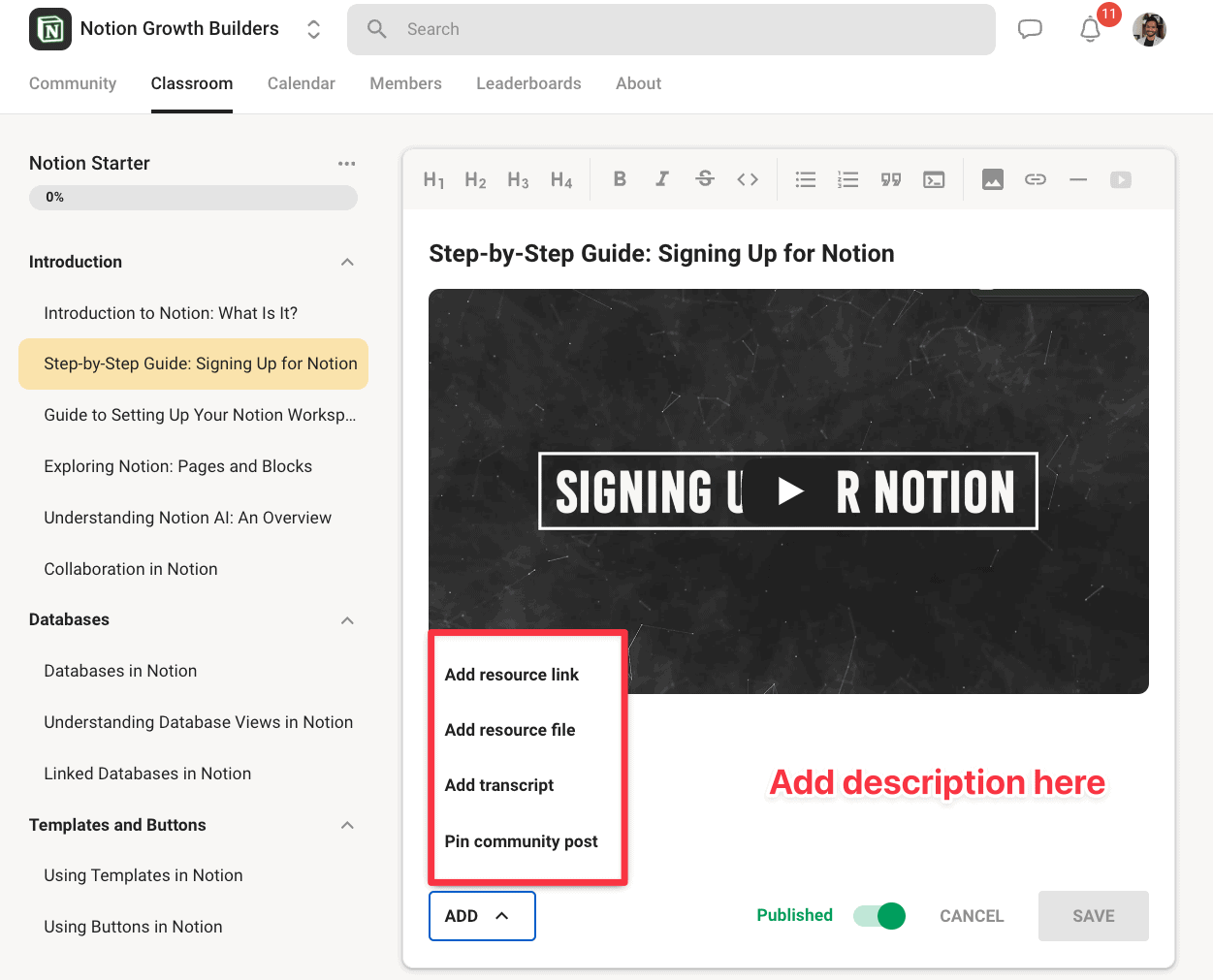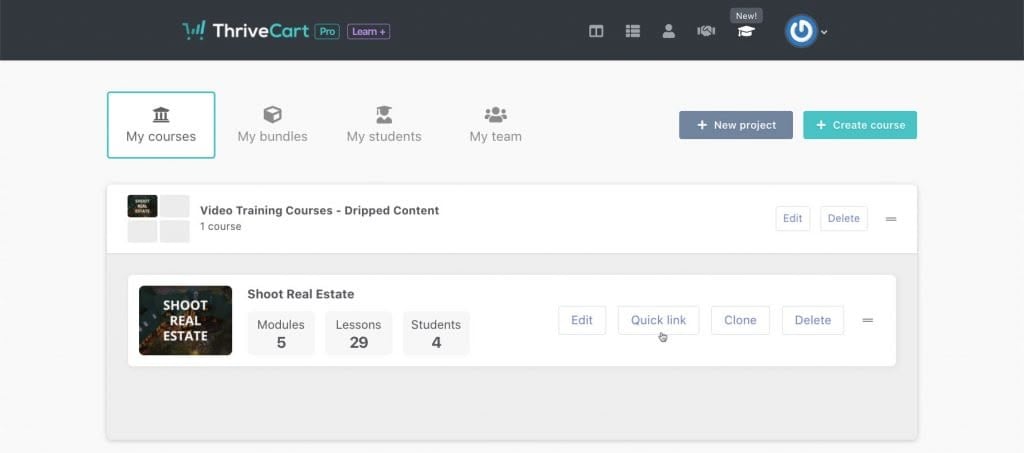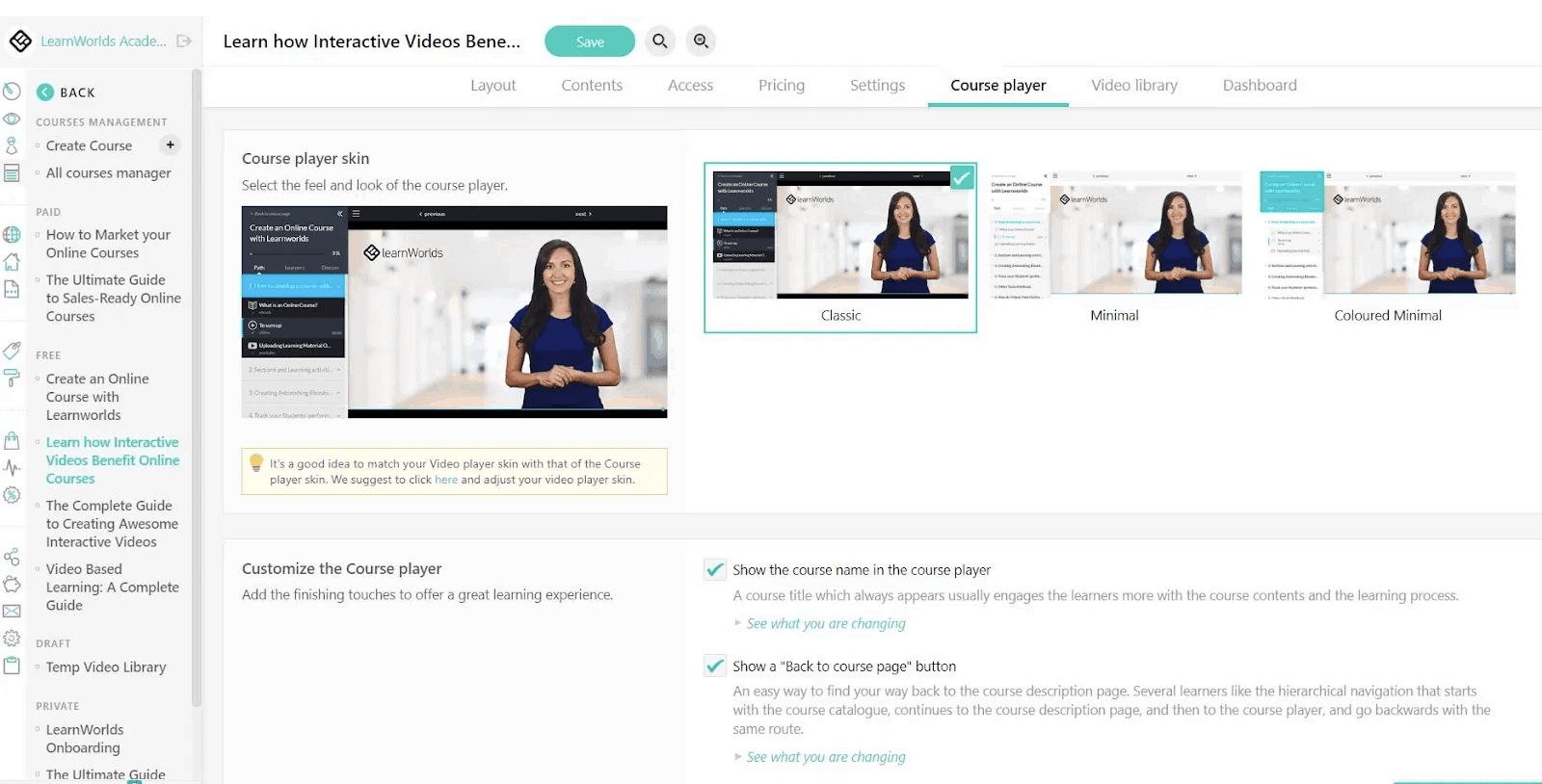Podia is a good all-in-one digital product selling platform.
But it may not be for everyone.
While it offers a lot of features, its features lack depth. It’s almost like a jack of all trades and master of none.
Look no further! In this blog post, we’ll present some of the best alternatives to Podia.
Here are our top 5 picks, if you’re in a hurry:
| Product name | Courses | Community support | Mobile apps | Starting price |
| Skool | Yes (limited features) | Yes – Strong /w gamification | Yes (iOS & Android) | $9/mo |
| ThriveCart Learn | Yes (limited features) | No | No, but good web interface | $495/life-time |
| Thinkific | Yes (specialized features) | Limited | Yes (iOS & Android) | $49/month |
| Kajabi | Yes (specialized features) | Yes – Strong /w gamification | Yes (iOS & Android) | $89/month |
| Circle | Yes (good features) | Yes | Yes (iOS & Android) | $89/month with transaction fee |
Skool – Community-centric affordable alternative

Skool is a community-first platform created by Sam Ovens in 2019.
It brings a fresh take on online communities with a laser focus on keeping members engaged through gamification.
Unlike old-school community platforms that are just fancy forums, Skool pushes members to actually participate.
But, how? It’s through clean, simple interface and game elements like points, levels, and leaderboards.

The platform lets you create courses too, with content organized in folders and pages.
While it doesn’t have some advanced marketing features and customization options found in other dedicated course platforms, its community-centered approach makes it special.
Recently, Alex Hormozi put his money where his mouth is and invested in Skool. He called it the biggest investment of his life, which has really boosted confidence in where the platform is headed.
Pros 👍
- Affordable pricing: Starts at just $9/month on the Hobby plan, making it one of the most affordable options.
- Intuitive UI/UX: Clean, minimal interface that drives higher engagement rates compared to other platforms.
- Powerful gamification: Includes points, levels, leaderboards, and streaks to boost community engagement.
- Community discovery: Features a “Discover” function to help you find relevant communities and generate organic leads.
- Mobile apps: Offers feature-rich iOS and Android apps with push notifications.
- Level-based access: Ability to unlock courses and features as members level up through engagement.
Cons 👎
- Limited marketing features: Lacks checkout customization, order bumps, and upsells.
- Limited customization: Minimal design options and no support for custom domains.
- No native integrations: Relies heavily on Zapier for connecting with other tools.
- Basic text editor: Cannot bold or italicize text in the community posts.
When it comes to pricing, Skool offers 2 pricing plans.
- Hobby Plan ($9/mo): Gives you almost everything you need but has a 10% transaction fee. You get just one admin account. No extra admins, moderators, or team members to help you manage things.
- Pro Plan ($99/mo): Comes with a much lower 2.9% transaction fee. You can add multiple admin accounts as your team grows. You also get custom URL options and can hide those suggested communities that pop up.
I personally have my community in Skool, you can read more here in my standalone review post
🏆 Bottomline: Skool is an excellent affordable alternative to Podia if you’re focused on building an engaged community around your courses. With its intuitive interface and powerful gamification features starting at just $9/month, it offers tremendous value. However, it lacks some advanced marketing features and customization options found in more expensive platforms.
ThriveCart Learn– One-time payment alternative
ThriveCart Learn is an integrated online course builder offered within the ThriveCart ecosystem, making it easy for creators to sell and deliver digital courses all from one platform.

With a drag-and-drop course builder, you can quickly structure modules, lessons, and multimedia content without needing any technical skills.
It is designed for both beginners and established entrepreneurs seeking simplicity and flexibility in launching digital products, memberships, and online training programs.
Here’s why creators are jumping ship from traditional LMS platforms to ThriveCart Learn:
- One-time payment: Pay once, own forever – no monthly fees eating into your profits
- Sales boosters built-in: Ready-to-use upsells and sales tools that actually convert
- Dead-simple interface: Even tech-challenged creators can get it running in minutes.
It’s the perfect fit if you’re an entrepreneur who wants to sell digital products without complicated tech setups.
But let’s be honest – if you need fancy academic features or detailed learning stats, you’ll probably want to look at dedicated LMS platforms instead.
Pros 👍
- One-time payment: Lifetime pricing with no recurring fees
- Unlimited resources: No limits on courses, products or students
- Easy content creation: Simple drag-and-drop interface anyone can use
- Sales optimization: Powerful funnel and upsell tools to boost your revenue
- Affiliate marketing: Built-in affiliate system in the Pro version
- Scalable features: Grow with tiered upgrades (Learn+, Pro)
Cons 👎
- Limited customization: Not many options to brand your courses
- External hosting: Videos aren’t hosted directly on the platform
- Upfront cost: The one-time fee might be too much for beginners
- No mobile app: Students can’t access courses through a dedicated app
ThriveCart offers three pricing plans that won’t drain your bank account:
- Standard plan: $495 one-time payment (lifetime access)
- Pro plan: $690 one-time (adds affiliate center, advanced user management)
- Learn+: $195 one-time for team access, course bundles, advanced sequences
All plans include unlimited products, students, and courses with zero ThriveCart commissions.
🏆 Bottomline: ThriveCart Learn is the perfect Podia alternative if you hate monthly subscriptions. Pay once and you’re done. But it’s not for everyone. If you want fancy course branding or built-in video hosting, you might find it limiting.
Thinkific – LMS-centric cheap alternative

Thinkific is a dedicated course building platform that can be considered a reliable alternative to Teachable. It specializes in course creation, rather than being an all-in-one platform.
It has the ability to host course videos, superior assessment features, quizzes, and improved course compliance features.
This allows you to track progress on a student level, as it has advanced analytics, including per-student video retention rates.
Pros 👍
- Rich content options: Engage students with all kinds of media – videos, audio, PDFs, quizzes, surveys, assignments, and live lessons.
- Advanced course features: Get scheduled content drip-feeding, multiple instructors, discussion areas, and evergreen content that’s always available.
- Detailed analytics: See exactly how students engage with your content through comprehensive metrics, video retention graphs, and progress tracking.
- Built-in community: Create social learning spaces right inside your course without needing extra tools.
- Robust assessment tools: Add quizzes, exams, and assignments with completion requirements to ensure students master the material.
- Comprehensive integrations: It offers good range of integrations with various products for eCommerce, automation tools, analytics, and email marketing.
Cons 👎
- Restricted design flexibility: Limited theme options that require HTML/CSS knowledge if you want to customize beyond the basics.
- Mobile app limitations: Free app shows Thinkific branding everywhere; removing it costs a whopping $199/month extra.
- Basic marketing capabilities: Missing the advanced marketing automation tools you’d find in all-in-one platforms.
- Simplistic community features: Lacks the advanced gamification and engagement tools that dedicated community platforms offer.
Let’s talk about Thinkific’s pricing.
They have different plans to match what you need.
The Basic plan starts at $49/mo, while the Start plan is $99/mo.
Most people choose one of these 2 plans because you get unlimited courses and landing pages with both.
But if you want better features like detailed analytics, advanced course-building tools, or to remove Thinkific branding, you’ll need to look at their pricier plans.
🏆 Bottomline: Thinkific is a great specialist course platform. With its robust features, integrations, and affordable pricing, Thinkific truly stands out as a top Podia alternative.
Kajabi – Premium alternative

Kajabi is a more powerful all-in-one digital selling platform compared to Podia.
It comes with:
- Online courses
- Coaching
- Gamified communities
- Email marketing
- Webinars
- Website building.
The best part about Kajabi is that all these features are tightly integrated with each other, with the automation engine on top, so you can set triggers and actions.

For instance, you can link the course feature with the email marketing feature so that whenever a lesson is completed, it will trigger an email encouraging students to keep it up.
Despite being an all-in-one platform (like Podia), Kajabi has great depth in its features.
Pros 👍
- Comprehensive email marketing: Comes with a robust system that includes templates, automation, and a mini CRM.
- Powerful automation engine: Features solid automation that works smoothly across all its tools and features.
- Comprehensive analytics: Shows detailed retention graphs and heatmaps for videos so you can spot exactly where students drop off.
- Enhanced gamification: Uses points, badges, leaderboards, and challenges to keep community members engaged and motivated.
- Built-inlive events: Includes built-in live streaming so you don’t need Zoom or other third-party tools.
- Bettercourse compliance: Lets you lock content until previous modules are completed, making sure students follow the right learning path.
- Feature-richwebsite builder: Unlike competitors, it offers full website functionality with blogging capabilities.
Cons 👎
- Limited integrations: Only offers around 10+ native integrations, so you’ll need Zapier for most third-party connections.
- Platform limitations: Despite its premium pricing, Kajabi puts significant restrictions on all its plans that limit how much you can scale and customize.
Let’s look at Kajabi’s pricing options:
- Kickstarter plan ($89/mo): Made for solo creators just starting out. It has many limits that push you to upgrade to pricier plans.
- Basic plan ($149/mo): Ideal if you’re just launching your first few digital products which comes with only 3 products.
- Growth plan ($199/mo): The most popular choice with room for 15 products and 10,000 active members. You’ll get advanced automation features and can run your own affiliate program.
- Pro plan ($399/mo): For established businesses needing space for 100 products and 100,000 contacts. Includes code editor access and 3 websites.
Try Kajabi free for 30 days to see if it fits your needs before pulling out your credit card.
🏆 Bottomline: Kajabi is the best alternative to Podia and it comes with real depth to its features. However, it’s more of a premium alternative.
Circle – Community-centric course platform
Circle is one of the newest community-centric course platforms.
It was launched in 2019 by Sid Yadav, who is Teachable’s first designer, and later backed by Ankur Nagpal (invested 90% of his liquid net-worth), the founder of Teachable.

I have high conviction about this platform because the founders have a great track record with Teachable and are following success patterns from cutting-edge startups like Slack and Notion.
They help you build customizable, flexible community-centric courses.
The future is in communities – people want more than just pre-recorded videos. Circle captures this perfectly.
Their main focus areas:
- Community building (with live streaming, gamification and AI)
- Advanced course features
- Automation workflows (triggers and actions)
- Integrations and APIs
I really like that they’re focusing on things that actually matter to us as users.
Pros 👍
- User-friendly interface: Simple, clean design that’s easy to navigate and use
- Course capabilities: Powerful tools for creating and managing courses
- Live engagement: Built-in streaming features to connect with your audience in real-time
- Time-saving automation: Workflows that handle repetitive community tasks so you don’t have to
- Enhanced engagement: AI tools and gamification features that keep community members active and interested
- Mobile accessibility: Well-designed apps for both iPhone and Android devices
Cons 👎
- Marketing limitations: Can’t build landing pages within the platform
- Communication gap: No built-in email marketing tools
- Basic course features: Missing important tools like certificates, course compliance, graded quizzes, video analytics, and heatmaps (though they’re planning to add these)
Circle gives you three pricing options:
- Professional plan ($89/mo): Perfect for individuals and small creators with rich member profiles, courses, and live streaming features.
- Business plan ($199/mo): Great for growing communities with automation workflows, custom profile fields, and branded notifications.
- Enterprise plan ($419/mo): Built for large organizations needing full API access, AI-powered tools, Single Sign-On (SSO), and advanced analytics.
Things to watch out for:
- All their plans are billed annually (see the asterisk *)
- The transaction fee is not disclosed in the pricing page.
- They don’t clearly tell you how many workflows you actually get with their Business plan.
🏆 Bottomline: Circle is a promising community-centric course platform that I have high confidence in, as it is spearheaded by the founding team of Teachable. Although it is not an all-in-one platform, it has really strong features when it comes to communities, courses, and workflow automation.
Teachable – Specialist in course creation

Teachable is a popular online course platform that specializes in course creation.
While not an all-in-one platform like Podia, Teachable offers superior course features:
- Course compliance mechanisms
- Multiple content types within lessons
- Comprehensive quizzes
Teachable gives you a more flexible design experience compared to Podia.
It comes with advanced marketing features that make it a great Podia alternative:
- One-click upsells
- Affiliate marketing
- Email marketing
With professional templates, advanced coding options ($119/month plan), and various integrations, it gives you more control and customization.
Pros 👍
- Flexible lesson builder: Mix different content types in one lesson – videos, text, quizzes, and even upsells.
- Budget-friendly option: Starts at $39/mo, much cheaper than Kajabi’s $89/mo entry plan.
- Enhanced student experience: Includes mini-player (like YouTube’s picture-in-picture) and time-stamped notes for better learning.
- Superior course compliance: Tracks everything – enforces video watching, lesson completion order, and quiz passing requirements.
- Certificate variety: Offers three certificate templates plus custom HTML/Liquid template options.
- Detailed analytics: Shows comprehensive student tracking and video engagement with helpful heatmaps.
- Seamless payment processing: Comes with “Backoffice” to handle complex payouts and affiliate management.
Cons 👎
- Transaction fees: Takes a 7.5% cut on the Starter plan ($39/mo).
- Strict product limitations: Heavily restricts published products (only 1 on Starter plan, 5 on Builder plan).
- No built-in marketing tools: Missing email marketing and automation features, so you’ll need external tools.
- Basic customization: Limited design options with just basic branding controls and few page building blocks.
- Incomplete mobile access: Only has an iOS app, nothing for Android users.
- Limited integrations: Very few native integrations compared to competitors.
- Restricted support hours: Support only available weekdays from 10am to 5pm EST.
Teachable hits you with a huge 7.5% transaction fee on their Starter plan ($39/mo).
Want to get rid of that fee? You’ll need to upgrade to their pricier plans.
You can create unlimited draft products across all Teachable plans.
But published product limits are strict:
- Starter ($39/mo): just 1 product
- Builder ($89/mo): 5 products
- Growth ($189/mo): 25 products
- Advanced ($399/mo): 100 products
You might be better off with an all-in-one platform like Kajabi or even Podia, which offer more features at similar price points.
🏆 Bottomline: Teachable is a great option for those looking for superior course creation and advanced marketing features. However, it’s not an all-in-one platform.
Sellfy – Best for digital products

Sellfy is a platform for selling digital products, physical products, and subscriptions.
It offers more versatility in selling different types of goods, including print-on-demand capabilities.
This is something you can’t do with Podia, as it lacks inventory management and fulfillment abilities.
Additionally, Sellfy offers many marketing features such as the ability to set up upsells and one-click checkout.
You can also use embeddable buy buttons, which is especially useful if you are using WordPress and integrates with Stripe and PayPal for payment gateways.
Pros 👍
- Free trial availability: Offers a 14-day free trial so you can test before committing.
- Flexible pricing options: Monthly fees ranging from $29 to $129, with annual plans offering savings.
- Digital product selling: Sellfy is a viable alternative to Podia for selling digital products.
- Print-on-demand feature: Print-on-demand capabilities allow you to sell custom-printed merchandise.
- Shopping cart functionality: Built-in shopping cart makes purchasing simple for your customers.
- Advanced marketing tools: Offers more comprehensive features for effective upsells and storefront customization.
- Embeddable elements: Embeddable buy buttons let you sell from your existing website.
Cons 👎
- Limited course features: Lacks specialized features in course creation.
- Premium features paywalled: The decent plan costs $49/month if you want to remove Sellfy branding, need cart abandonment, and product upselling.
🏆 Bottomline: Sellfy caters to those who want a platform for selling digital and physical products with versatile selling options, print-on-demand capabilities, and many marketing features. It’s a viable alternative to Podia for those who value these features and don’t need specialized course creation features.
LearnWorlds – Academic centric alternative
LearnWorlds is an all-in-one platform for course creation and communities.
Despite having many features and customization options, its UI and UX feel cluttered and unintuitive.

The platform primarily targets academic use cases with its course functionality.
It offers powerful assessment tools, quiz features, and supports SCORM and HTML5 packages for industry compliance.
LearnWorlds’ standout feature is interactive videos – letting you add elements on top of your course videos to boost student engagement, especially for academic purposes.
The community feature has a classic, old Facebook-like feel. You can add friends, create groups, react to posts, comment, conduct polls, and more.
Pros 👍
- Interactive learning: Videos with clickable elements that keep students engaged
- Advanced assessment: Better quizzes and thorough evaluation options
- Real-time teaching: Live classes and webinars to connect with students
- Industry standards: Works with SCORM and HTML for professional compliance
- Revenue maximization: Create bundles, upsells, and sales funnels easily
- On-the-go access: Mobile app so students can learn anywhere
- Custom branding: White labeling to match your brand perfectly
Cons 👎
- Outdated interface: The UI feels cluttered and old-fashioned
- Price barrier: You’ll need to pay $249/month to get the best features
👉 Note: The interactive videos, course insights, mobile apps, white labeling, are only available in the highest $249/month plan.
🏆 Bottomline: Although LearnWorlds comes with many features and is an all-in-one platform, its UI and UX leave much to be desired. Additionally, the features lack depth. Often, it feelsthat rather than focusing on the number of features that many people don’t use, such as the ebook builder, they need to focus of mastering the basics.
LearnDash – The most flexible WordPress LMS.

LearnDash is a WordPress plugin for flexible and customizable online course creation.
Key features:
- Online courses
- Memberships
- Quizzes and assessments
It comes with numerous 3rd-party add-ons and WordPress plugin integrations to extend functionality. It integrates seamlessly with popular WordPress products like WooCommerce, Elementor, and others.
👉 Personally, I use LearnDash – along with CartFlows, WooCommerce, and Elementor – for more design customizations.
However, LearnDash might slow down due to conflicts with other plugins. This isn’t unique to LearnDash but common with WordPress plugins generally.
Pricing is based on site licenses.
- For 1 site – $199/year.
- For 10 sites – $399/year.
- For unlimited sites – $799/year.
It’s a one-time purchase, but you’ll need to pay for ongoing updates and support.
🏆 Bottomline: LearnDash is a great plugin for those looking for a flexible and customizable course creation tool that integrates well with WordPress.
Memberful

Memberful is a comprehensive hosted solution for membership sites that offers:
- Access groups
- Optimized checkouts
- Analytics
- Member management
It integrates with major email marketing platforms and Zapier, plus offers API and webhooks.
WordPress users get an easy-to-implement plugin.
Pricing is straightforward: $49/month with transaction fee. Try it free until you start accepting payments.
🏆 Bottomline: Memberful is a great Podia alternative if you are looking for memberships feature on a budget. But it doesn’t come with course selling features.
Verdict
In summary, Podia is an affordable all-in-one platform for the courses it offers. However, it lacks mobile apps, and its community feature is rather basic.
If you are willing to pay a premium for more features, Kajabi would be the ideal choice. Kajabi not only includes all the features that Podia offers, but it also has real depth to its features, replacing many specialist tools like community platforms, webinar platforms, and email marketing platforms.
On the other hand, if you don’t want an all-in-one platform but only a specialist course platform, Thinkific would be the choice.
If you want a community-centric course platform backed by the former team of Teachable, then Circle would be the best alternative. Although it’s not an all-in-one platform, I really like it because they are following the footsteps of new-age startups like Slack and Notion, enabling good customization options to build your community-centric course platform. However, note that you still need to use separate email marketing and landing page software along with Circle.






